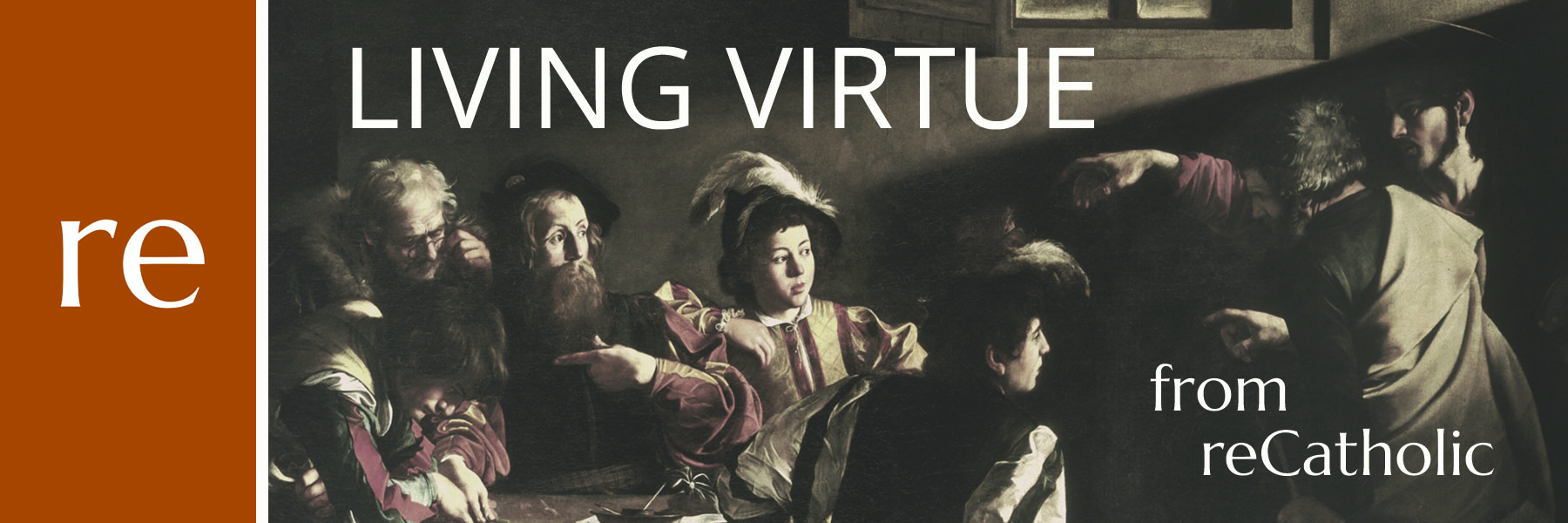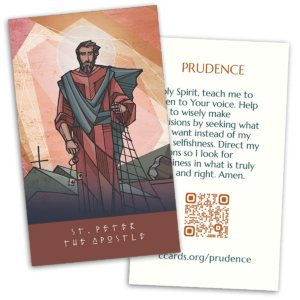
Virtue – Prudence
Prudence is about making the best choice of how to achieve a goal when there are multiple options possible. A prudent person, after deciding where they are going, figures out the best way to get there.
1. Understand Prudence
What is Prudence?
In every goal that we seek, there are always many different ways to achieve it. The virtue of prudence helps us to think through the options for arriving at the desired outcome, then to choose the best path given the circumstances, and finally to carry out that chosen path.
As with all virtues, the more we practice them, the better we can get at them. Making choices, again and again, can help us to learn from our mistakes and to grow in prudence. This is why the elderly are often considered prudent mentors for young people in life — they have the experience of making decisions over a lifetime, and have learned from their past.
All the other virtues rely on prudence, because no matter the virtue, we always need to choose the best path to achieve our goal. That is why prudence is considered one of the four cardinal virtues — every good choice requires some level of prudence.
From the Catechism
1835 Prudence disposes the practical reason to discern, in every circumstance, our true good and to choose the right means for achieving it.
The Virtue Lived – St. Peter the Apostle
 “The prudent man looks where he is going” (Prov 14:15).
“The prudent man looks where he is going” (Prov 14:15).
St. Peter, named Simon by his parents, was the son of a fisherman. Despite his rough, imprudent character, Simon was chosen, alongside his brother Andrew, to be one of the twelve disciples.
He was rash, questioned Jesus, and even rebuked Him when he spoke of His pending crucifixion. Despite all of this, Jesus knew Simon’s abilities and chose him to lead his Church as the first Pope, even renaming him “Peter,” which means “rock.”
During Jesus’s public ministry, St. Peter accompanied Jesus and witnessed many miracles first-hand. Among these, he watched Him heal his Mother-in-law, feed the 5,000, and walk on water.
Peter’s greatest lack of prudence was when he denied Jesus three times during His passion. Yet after His resurrection, Jesus took St. Peter aside, offering him forgiveness and renewing His call to “lead His sheep.”
The Lord knew that St. Peter was capable of growth and that as long as Peter trusted Him, he could prudently guide the Church along the right path.
St. Peter led the Church after Jesus’ ascension into heaven. He lived his years in obedience to God, converting many souls to Christianity, wrote two books of the New Testament, and ultimately laid down his life as a martyr for Christ.
2. Virtue In My Life
Spiritual Questionnaire
Questions geared towards self knowledge and personal growth
Struggles
- Do I ever act quickly or rashly without first reflecting calmly on what would be the most prudent thing to do? What causes me to do this?
- Are there perhaps moments when I hesitate to get something done or to make a final decision? Is this out of fear, laziness, or because of what others might think? What keeps me from doing what I know is right?
- Do I try to learn from past mistakes or successes? Do I take time to think about what good things I have done in the past that I can imitate in the future, or mistakes that I should avoid from now on?
- Are there people in my life who I turn to regularly for advice and counsel in different areas of my life: relationships, schooling, finances, career choices, etc.?
Highlights
- Is there an area of my life where I feel very confident about making progress? Reflecting on this area, is there anything I can learn about how I take time to reflect, to make lasting decisions, and to carry them out successfully? Do I do research, talk to friends, try things out, etc.?
- Who are the wisest people I know? Do I spend enough time with them? Do I talk about the things that are hard for me, or where I need to grow?
- Do I read good books that are well-known for their wisdom and guidance? Do I spend time writing down things that I have learned?
- Do I challenge myself to try new things, or to learn new habits? Am I open to listening to the experiences of others, even if I’m not already interested in the topic?
Prayer
- Do I bring big decisions to God in prayer? Do I keep a list of the things that I need to think and pray about frequently, because they are most important in my life?
- Do I ask the Holy Spirit for His Gifts of Wisdom and Counsel, so that my life is guided continually by God’s insight and love?
- When challenged with difficult situations in life, do I pause and pray, asking for strength and insight so as to make the right decision?
- Do I meditate on God’s love and providence in creating all things, and understand that, since He wants all people to be happy, He will thus be able to help me prudently choose the best path in every situation?
3. Growing In Virtue
A Prayer for Virtue
Holy Spirit, teach me to listen to Your voice. Help me to wisely make decisions by seeking what You want instead of my own selfishness. Direct my actions so I look for happiness in what is truly good and right. Amen.
St. Peter the Apostle // Pray for us!
Practical Tips for Living This Virtue
- In every choice that you have to make, it can be helpful to break out the steps and to make sure that you intentionally choose each part:
- Ask firstly: Am I seeking the right thing? In other words, is this really what I want? Is this what is best for me?
- Then, secondly, take time to make sure that you’ve chosen the best way to achieve that goal. Is there a better way to go about this?
- Lastly, set your will firmly on the path that you’ve chosen, until you’ve brought it to completion. Determine not to rest until you’ve completed your personal mission of bringing this about.
- A wise person depends on the wisdom of those who have already experienced much in this world. To grow in prudence, first find solid, trustworthy mentors in each area of your life and then make sure that you rely on their advice when making important decisions in those areas.
- Postponing an important decision is often just as much a decision as deciding on a specific option. When you are challenged with a fork in the road of life, as it were, make sure that you don’t avoid choosing just because it’s hard. Ask trusted experts, do your research, spend time asking God for guidance in prayer, and then set aside the time necessary to deliberate and determine what is best.
4. Other Resources
The Catechism
1806 Prudence is the virtue that disposes practical reason to discern our true good in every circumstance and to choose the right means of achieving it; “the prudent man looks where he is going.”65 “Keep sane and sober for your prayers.”66 Prudence is “right reason in action,” writes St. Thomas Aquinas, following Aristotle.67 It is not to be confused with timidity or fear, nor with duplicity or dissimulation. It is called auriga virtutum (the charioteer of the virtues); it guides the other virtues by setting rule and measure. It is prudence that immediately guides the judgment of conscience. the prudent man determines and directs his conduct in accordance with this judgment. With the help of this virtue we apply moral principles to particular cases without error and overcome doubts about the good to achieve and the evil to avoid.
1786 Faced with a moral choice, conscience can make either a right judgment in accordance with reason and the divine law or, on the contrary, an erroneous judgment that departs from them.
1787 Man is sometimes confronted by situations that make moral judgments less assured and decision difficult. But he must always seriously seek what is right and good and discern the will of God expressed in divine law.
1788 To this purpose, man strives to interpret the data of experience and the signs of the times assisted by the virtue of prudence, by the advice of competent people, and by the help of the Holy Spirit and his gifts.
1789 Some rules apply in every case:
- One may never do evil so that good may result from it;
- the Golden Rule: “Whatever you wish that men would do to you, do so to them.”56
- charity always proceeds by way of respect for one’s neighbor and his conscience: “Thus sinning against your brethren and wounding their conscience . . . you sin against Christ.”57 Therefore “it is right not to . . . do anything that makes your brother stumble.”58
Quotes From Saints
What a sacred ignorance it is that loses sight of the wisdom and prudence of this age in order to learn the science and wisdom of the saints in the school of the Holy Spirit! – Paul of the Cross
One righteous soul can obtain pardon for a thousand sinners. – Margaret Mary Alacoque
In the case of the virtues, sir, it is very easy to pass from defect to excess, from being righteous to being rigorous and rashly zealous. It is said that good wine easily turns to vinegar. – Vincent de Paul
By what has been, let us avoid what is to be; let us be taught by what has come, to escape what is coming; let us remember what is past, to avoid what is future. – Ephraem the Syrian
Among all human pursuits, the pursuit of wisdom is more perfect, more noble, more useful, and more full of joy. – Thomas Aquinas
Take away free will, and there remains nothing left to save. … Salvation is given by God alone, and it is given only to the free will. Even as it cannot be wrought without the consent of the receiver, it cannot be wrought without the grace of the Giver. – Bernard of Clairvaux
Books
Prudence, Justice, Courage, and Temperance: The Cardinal Virtues – Andrew Pinsent
Videos
Prudence according to Aquinas – Fr. Gregory Pine, O.P.
Prudence – Three Minute Theology
Videos en Español
Virtud de la prudencia – Virtudes Humanas
Footnotes
56 Mt 7:12; cf. Lk 6:31; Tob 4:15.
57 1 Cor 8:12.
58 Rom 14:21.
65 Prov 14:15.
66 1 Pet 4:7.
67 St. Thomas Aquinas, STh II-II, 47, 2.